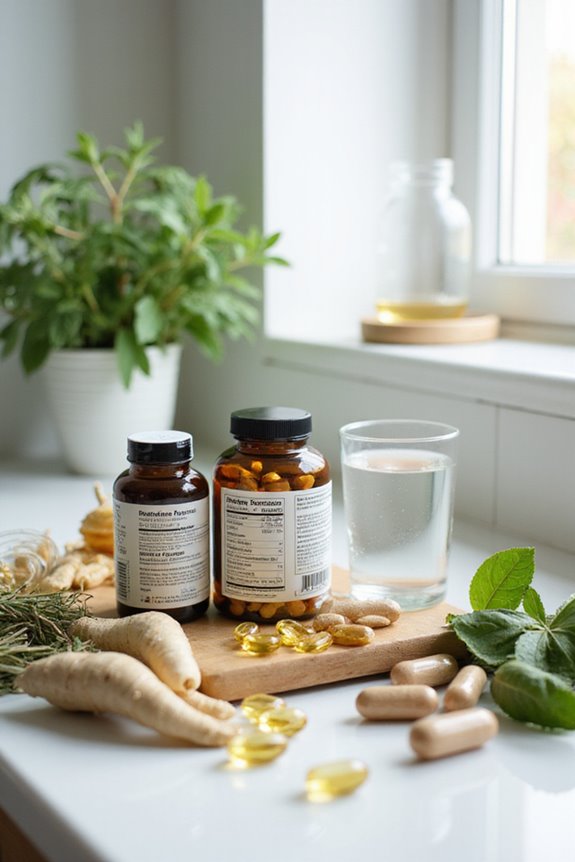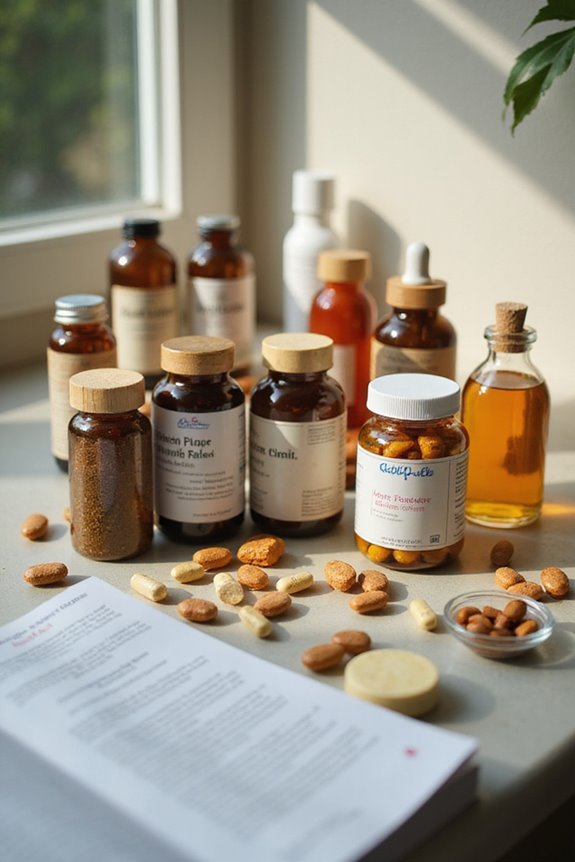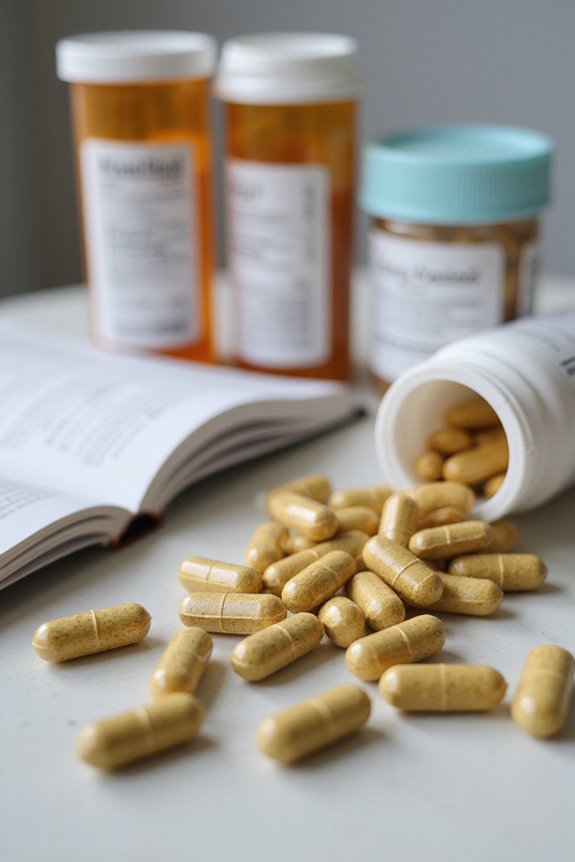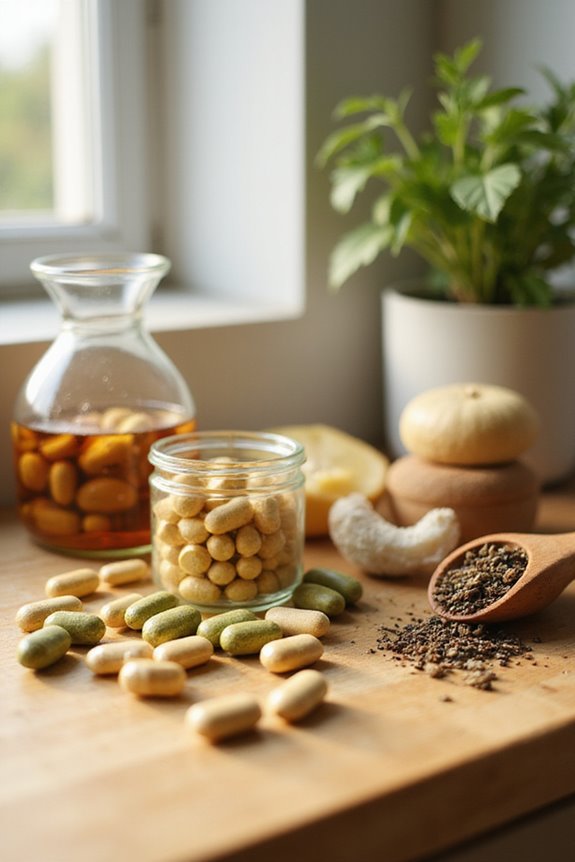Daily use of herbal supplements poses safety concerns. Potential side effects include gastrointestinal issues, hypertension, and interactions with prescription medications. Approximately 33.6% of older adults risk adverse outcomes when combining herbs with conventional drugs. Regulation is limited, as manufacturers aren’t required to prove safety or efficacy before marketing. Quality can vary due to mislabeling and contamination risks. Consumers should remain vigilant and informed about these products. More insights into herbal supplements will follow.
Key Takeaways
- Daily use of herbal supplements can pose risks, including potential side effects and interactions with prescription medications.
- Safety and efficacy of herbal supplements are not guaranteed, requiring consultation with healthcare providers before daily use.
- Quality control varies among products; third-party testing is crucial to ensure safety and accurate ingredient labeling.
- Some herbs may lead to adverse effects, such as gastrointestinal issues or cardiovascular risks, particularly at high doses.
- Awareness of individual health conditions and possible drug interactions is essential for safe daily consumption of herbal supplements.
Understanding Herbal Supplements and Their Uses
While many individuals seek alternative health solutions, herbal supplements represent a diverse category of plant-derived products utilized for medicinal purposes. These supplements, often referred to as botanicals or phytomedicines, derive from various parts of plants, including leaves, roots, and seeds. They are available in multiple forms, such as teas, capsules, and topical gels.
Key uses include:
- Immune support: Herbs like ginseng and turmeric are believed to enhance immune function.
- Mood enhancement: St. John’s wort is noted for its potential benefits in managing mood.
- Digestive health: Ginger has established efficacy in alleviating nausea.
Despite their herbal origins and purported medicinal benefits, users should consult healthcare providers for personalized advice before incorporating these supplements into their routine.
Regulatory Landscape: What You Need to Know

The regulatory landscape surrounding herbal supplements is shaped by distinct guidelines that differ markedly from those governing pharmaceutical drugs. Herbal supplements are classified under the Dietary Supplement Health and Education Act (DSHEA) of 1994, which presents significant regulatory challenges for consumer protection.
Key points include:
- Manufacturers are not required to prove safety or efficacy before marketing.
- The FDA can remove unsafe supplements, but enforcement is often slow.
- Good Manufacturing Practices (GMP) necessitate quality assurance but do not eliminate contamination risks.
- Labels must disclose ingredient identity, yet mislabeling can occur.
- No standardized dosage guidelines exist, relying instead on traditional use.
Common Adverse Effects and Health Risks

Common adverse effects and health risks associated with herbal supplements are significant concerns for consumers and healthcare providers alike.
Cardiovascular and Neurological Risks
- Ephedrine-containing supplements can lead to serious cardiovascular events, including hypertension and arrhythmias, particularly in individuals under 40.
- Ginseng may cause agitation and insomnia at high doses.
Hepatotoxicity Risks
– Popular supplements like green tea extract and turmeric have been linked to liver injury, affecting approximately 15.6 million U.S. adults.
Gastrointestinal and Allergic Reactions
– Common reactions include nausea, vomiting, and diarrhea. Allergic responses can range from rashes to severe anaphylaxis.
Toxicity from Contaminants
– Contaminants such as heavy metals and pesticides present serious health hazards, complicating safety assessments.
These adverse reactions underscore the need for caution with herbal supplement use.
Drug Interactions: A Hidden Danger

Drug interactions represent a significant and often overlooked risk associated with herbal supplements.
- Approximately 33.6% of older adults concurrently use herbal medicinal products with prescription drugs, increasing the likelihood of interactions.
- One-third of these users may face hazardous outcomes due to potential herb-drug interactions.
- Common herbs like St. John’s wort, ginkgo, and ginseng are known to pose risks, particularly when combined with anticoagulants.
Understanding herb safety and maintaining interaction awareness is essential.
- The cytochrome P450 enzyme system is often affected, leading to increased drug toxicity or reduced efficacy.
- As herbal supplement use rises, especially among females and older adults, the need for vigilance regarding these interactions becomes paramount to guarantee safe and effective treatment outcomes.
Motivations Behind Herbal Supplement Use

Why do individuals increasingly turn to herbal supplements for health management? A range of herbal motivations drives this trend, particularly among those with chronic conditions.
- Approximately 48.7% of stroke patients, 43.0% of arthritis patients, and 43.1% of cancer patients utilize herbal supplements to alleviate symptoms and side effects from conventional treatments.
- Many adults cite improving overall health (45%) and maintaining wellness (33%) as primary reasons for their use.
- Health perceptions play an essential role, as users commonly view herbal products as more natural and safer than synthetic options.
- The desire for holistic wellness further influences choices, with many seeking preventive health measures, such as immunity boosting and energy enhancement.
Quality Control Issues in the Supplement Industry
Quality control issues in the herbal supplement industry pose significant challenges that can affect consumer safety and product efficacy.
- Standardization: Lack of standardized procedures in sourcing and manufacturing leads to variability in active compounds, impacting therapeutic effects.
- Contamination Risks: Pathogens and contaminants such as heavy metals can compromise safety, necessitating rigorous testing by manufacturers.
- Manufacturing Practices: Good Manufacturing Practices (GMP) are essential; however, many companies fail to adhere to adequate specifications, resulting in regulatory citations.
- Quality Assurance: Advanced analytical methods, including DNA barcoding, enhance verification processes, but inconsistency remains prevalent.
Continuous monitoring and adherence to regulatory frameworks are vital for ensuring product quality and protecting consumer health.
Importance of Third-Party Testing
The importance of third-party testing in the herbal supplement industry cannot be overstated, as it plays a critical role in ensuring product safety and efficacy.
- Verification of Ingredients: Third-party verification confirms that active ingredients are present in declared amounts, preventing allergic reactions and harmful interactions.
- Contaminant Detection: Independent labs screen for heavy metals, pesticides, and pathogens, reducing health risks and ensuring compliance with safety standards.
- Potency Assurance: Testing verifies that supplements contain effective levels of active ingredients, supporting correct dosing guidelines.
- Consumer Confidence: Third-party certification enhances trust, allowing consumers to distinguish reliable products from misleading claims.
This rigorous process promotes consumer protection, fosters market transparency, and encourages manufacturers to adhere to high-quality standards, ultimately benefiting the health and safety of consumers.
Consumer Awareness and Education
How can consumers effectively navigate the complexities of herbal supplements? Understanding the regulatory limitations is vital, as the FDA does not regulate these products as rigorously as pharmaceuticals. This leads to significant consumer misconceptions regarding safety and efficacy.
Education Strategies:
- Increase awareness of potential risks, such as adverse effects and interactions with medications.
- Encourage communication with healthcare providers to assess individual needs and risks.
- Promote transparency in labeling to guarantee consumers are informed about ingredients and potential side effects.
Statistics indicate that approximately 23,000 emergency room visits annually in the U.S. are related to dietary supplements. An informed consumer base is essential for minimizing risks and enhancing safety in herbal supplement use.
Trends in Herbal Supplement Consumption
Trends in herbal supplement consumption reflect a dynamic and evolving market landscape, shaped by consumer preferences, regional dynamics, and innovative product developments. The global herbal supplements market is projected to grow from USD 48.3 billion in 2022 to USD 94.3 billion by 2032, with a CAGR of 7-9%.
Key emerging trends include:
- Increased Demand: Driven by rising disposable incomes, particularly in emerging economies.
- Popular Herbs: Echinacea dominates the U.S. market, while adaptogens like shilajit are gaining traction.
- Convenient Formats: Capsules and gummies are replacing traditional forms, aligning with consumer preferences for ease of use.
- Regional Growth: Significant expansions noted in Germany, China, and Japan, fueled by health awareness and aging populations.
Making Informed Decisions About Daily Use
When considering the daily use of herbal supplements, it is essential to evaluate multiple factors that impact safety and efficacy. Individuals must adhere to daily usage guidelines and consult healthcare providers to make informed choices.
Key considerations include:
- Potential Risks: Side effects, drug interactions, and contaminants can affect health.
- Regulatory Oversight: The FDA has limited resources for inspection, relying on post-market surveillance.
- Quality Variability: The quality of herbal supplements can differ greatly, with some products containing unlisted ingredients.
- Monitoring Health: Regular health assessments are vital to identify any adverse effects.
Frequently Asked Questions
Can Herbal Supplements Replace Prescribed Medications Effectively?
Herbal supplements may offer certain benefits, but they cannot effectively replace prescribed medications due to potential medication interactions and inconsistent efficacy. Individuals should consult healthcare professionals to guarantee safe and informed choices regarding their health.
How Long Does It Take to See Results From Herbal Supplements?
Like planting a garden, the herbal efficacy timeline varies; some seeds sprout quickly while others take time. Supplement absorption rates and individual factors influence outcomes, with noticeable effects often emerging within days to months, depending on the herb.
Are Herbal Supplements Safe for Children and Pregnant Women?
Herbal safety for children and pregnant women remains a concern due to unpredictable reactions and dosage issues. Experts recommend caution, emphasizing the importance of consulting healthcare providers before using herbal supplements in these vulnerable populations.
What Is the Best Way to Store Herbal Supplements?
Studies show that improper storage can reduce herbal supplement potency by up to 50%. To preserve their benefits, use airtight storage containers and maintain consistent temperature control between 59°F and 77°F, away from sunlight and moisture.
Are There Specific Herbal Supplements for Improving Sleep Quality?
In sleep herbalism, natural sleep aids like valerian root, melatonin, and chamomile are frequently utilized. These supplements offer varying benefits, with consistent use enhancing sleep quality and fostering a sense of belonging in wellness communities.





